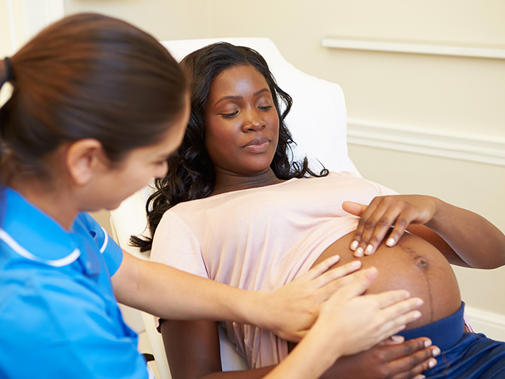Last month saw the close of a consultation on proposed NICE (The National Institute for Health and Care Excellence) guidelines for healthcare staff on inducing labour.
Among the recommendations included within the draft, under a section concerned with the prevention of prolonged pregnancy, NICE calls on staff to consider inducing birth from 39 weeks in ‘otherwise uncomplicated singleton pregnancies’ in Black and Asian women.
This proposed recommendation, made on the basis that women from these backgrounds are among those at ‘higher risk of complications associated with continued pregnancy’, was condemned by many health professionals, primarily for apparently encouraging decisions on healthcare to be based on a patient’s race.
We don’t really understand why Black and Asian women are overrepresentedDr Ekechi
The recommendation was further criticised, however, for the fact that such a blanket approach would do little to adequately address the many existing inequalities in maternity care outcomes experienced by many women from ethnic minority backgrounds.
A report looking at reducing inequalities in outcomes of maternity care published in December last year by Public Health England stated that Black and Asian women are respectively five times and twice as likely to die during pregnancy than white women.
Higher mortality
The report also found that women from ethnic minority backgrounds experienced poorer outcomes in other aspects of pregnancy and childbirth including neonatal mortality rates, pre-term birth and perinatal mental health.
‘It’s important to recognise where this guidance came from and the fact that we know Black and Asian women are overrepresented in the group that unfortunately suffer still births and early neonatal death,’ says consultant in obstetrics and gynaecology Christine Ekechi.
 EKECHI: Basing recommendations on race risks further undermining care
EKECHI: Basing recommendations on race risks further undermining care
‘We also know that induction of labour before 40 weeks could try and capture that proportion of stillbirths that occur in the later stages of pregnancy and produce a better outcome [but] the point is we don’t really understand why Black and Asian women are overrepresented in these statistics.’
Understanding the causes behind poorer outcomes in maternity care for Black and Asian women is complex and, according to PHE’s report, multifactorial and in need of further research.
The latter warns however that applying a ‘one-size-fits-all’ approach to maternity care combined with insufficient training and awareness of cultural sensitivities among staff can contribute to inequalities in healthcare outcomes and structural racism, and ‘personalised care is the key to safe care’.
Trust at risk
Dr Ekechi, who is the RCOG (Royal College of Obstetricians and Gynaecologists) co-chair for racial equality, says that while attempting to address inequalities in maternity care outcomes is laudable, basing recommendations on race is not only reductive but risks further undermining patient care.
‘If we were to induce a whole group of women based on the colour of their skin, what we do is remove choice for those women meaning they would be unable to have a home birth or water birth for example,’ she says.
‘That then further erodes the trust between a group of women and the healthcare system that we already know has issues. We also potentially expose those women to further intervention that may have implications for future pregnancies.’
Disparities in maternal outcomes are more than skin deepBMA
‘We hear over and over again [from] Black, Asian and other ethnic minority women that they are not spoken to with the care that places them at the centre of their health journey, that their voices are not heard and that when they present with concerns about themselves or their baby, they feel that they are dismissed.
‘This will definitely impact on the [maternity] outcomes, it’s not necessarily going to be the sole cause, but it’s definitely going to be a contributing factor. It’s important to acknowledge that and to think about how we can continually have the discussion about how we can be open and engage with these women.'
Informed choices
Responding to the draft guidance, the BMA says that disparities in maternal care and health are complex and more than ‘skin deep’, adding that further research and ensuring that women of all races are supported in making informed choices during pregnancy, are key to understanding and addressing inequalities.
It says: ‘We share the concerns of leading healthcare organisations surrounding inducing labour for women from Black, Asian, and minority ethnic backgrounds at 39 weeks. Disparities in maternal outcomes are more than skin deep.
‘Treating women from Black, Asian, and minority ethnic backgrounds as a homogenous group veils the distinct care needs of the women in each of these groups. It is vital that all women are empowered to make informed choices and advocate for themselves throughout their pregnancies.
‘This approach to care also risks perpetuating narratives that disparities in health outcomes are a result of biological racial differences, without taking into consideration structural inequalities. The BMA supports the call for further research into the underlying causes of disparities in maternal outcomes, so that healthcare providers can best support women during their pregnancies and after childbirth.’

